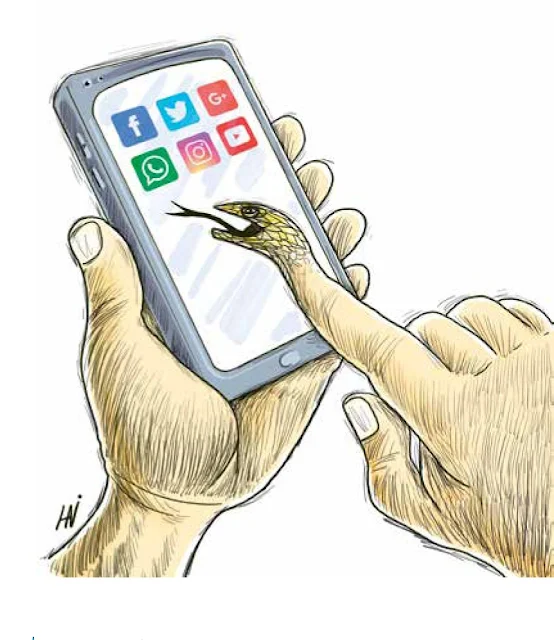Hate speech:
“online violence is real-world violence”
“May God save you and protect you from
our MeetinG because as a Man you will have to defend yourself, daMned M…..f…..,
I know how to defend the honour of My Grandchildren and My faMily…„
Threat sent to the cartoonist Bonil (Ecuador) by Jacobo Bucaram Pulley,
son of Abdalá Bucaram Ortiz (president of the country from 1996 to 1997)
after he posted a cartoon depicting him.3
"Censorship by algorithm feels more confounding than
traditional, state-led censorship (…) With today’s more subtle forms of censorship, the
powers that be “act like it’s open—but it’s not, and you get shadow banned and you get the filter bubble. (…) You have to really know how
to work the algorithms to get as much
reach as you used to get before (…)
It’s a different internet. "
Khalid Albaih (Sudan)3
Nowadays, cartoonists primarily use the internet to publish their work. There is no better way for a cartoonist to gain visibility, expand their audience, and publish cartoons otherwise rejected by their paper or magazine. But by becoming their own editor-in-chief, cartoonists must deal directly with all the misunder standings, disagreements and fierce reactions that festoon online platforms – virtual “town squares” where algorithms, a source of many CHALLENGES, encourage polarisation32.
The level of abuse varies and is difficult to quantify, especially considering that the vast majority of cartoonists surveyed (over 80%) consider silence the best response, never acknowledging online abuse when it happens. If they acknowledge taking the time to assess the risk inherent in each violent reaction, they have nonetheless reached a stage of weari ness that trivialises the violence.
But as Maria Ressa, joint 2021 Nobel peace prize-winner with Dmitri Muratov, reminds us, “online violence is real-world iolence”33. The gunning down of staff at Charlie Hebdo in 2015 and the more recent 2020 killing of the teacher Samuel Paty in France demonstrate the devastation wreaked by the spread of deadly ideologies and hatred online. In the United States, the controversy and online violence following the murder of George Floyd have contributed to a decline in the publication of cartoons. Meanwhile, the proliferation of conspiracy theories and unfounded speculation concerning COVID-1936, trends that raised valid concerns and presented challenges of their own, also meant that some cartoon
ists were unfairly characterised as peddling racism, antisemitism or misinformation during the pandemic period.
Most prominently, any cartoons about China – universally understood to be the point of origin for the virus – were met with outrage from supporters and representa tives of the Chinese authorities.
(to be continued...)
 |
| Jiho, (France) |
- "According to them, the (social Media) networks make you stupid and hateful!... "
- "Let them die"
---
Bu içerik CartoonsTurkiye (PencereMizah) tarafından hazırlanmıştır.



